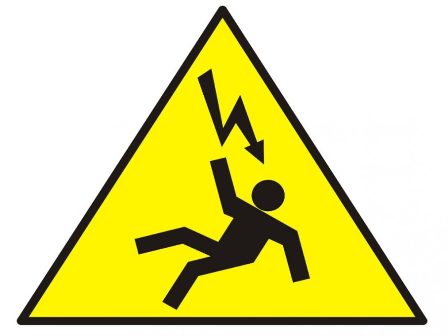Categories: Safety precautions
Number of views: 7029
Comments on the article: 0
What stress is dangerous to human life?
The problem of the danger of electric shock is known to everyone from an early age. Parents are afraid that the child accidentally crawls into the outlet, and regularly warn him against this. However, despite all the warnings, electric shocks happen, sometimes, unfortunately, fatal. This applies to both children and adults, and even professionals with experience.
As a rule, the tragedy happens by chance, maybe a person neglected safety measures at work, showed carelessness or simply overlooked the health of the household appliance in everyday life.
In any case, the human factor always takes place - the person is to blame. In the end, it was man who electrified the world, of course, we do not take lightning lightning into account. It doesn’t matter whether a person has come under low voltage or high, the defeat can be either imperceptible or completely insignificant, but it is always there.
It is important to understand that the determining factor in the defeat is not only the magnitude of the voltage or current strength, but also the time the electricity affects the body, and how long and through which parts of the body the current has passed.

Among other things, the emotional and physical state of a person at the time of his interaction with a source of electricity, even short-term, is of importance. The bottom line is that the conductivity of the body and skin at one point or another strongly depends on the person’s current state of health and simply on his mental state. Is a person dressed, what is he wearing, what is he standing on, how exactly does he come in contact with a dangerous conductor or with an electromagnetic field?
The catch is that we cannot clearly see the electricity present on any object, cannot smell it like a gas leak, and we understand (if we have time) that we got under it only when the trouble was in full swing. The current is already passing through the body or skin, it shakes us, it darkens in our eyes, our heart stops ... it happened like that.
There are cases when a person became ill from the action of 12 volts (in the literature there is a description of the case of death even from such a low voltage). Although the damaging effect of the current, in principle, can be very different: chemical, mechanical or thermal (burns). But more common are factors of involuntary muscle contraction, respiratory paralysis, cardiac arrhythmias, and cardiac arrest.

Many people want to know for sure what kind of voltage, current of what magnitude,constant or variableare most dangerous to human life. Here again there is no exact unequivocal answer, it all depends on the conditions. Even if a person is in a dry place, a voltage of 36 volts will already be dangerous for him.
A current of 0.1 A, if it passes through the body, will easily lead to death in seconds. Even a current of 0.05 A is a deadly threat. Convulsions simply will not allow you to quickly release from your hands, push or bounce from an object that is shocking. This is the main danger of a defeat with a voltage of more than 36 volts (depending on the state of the organism, the lower boundary is blurred, it cannot be said that 50, 100 or 200 volts will be fatal for one or another person).
We all know that from everyday static electricity you don’t seem to die. A man in rubber slippers walked along a woolen rug, then accidentally touched a cast-iron heating battery. I felt a blow or something like an injection. For the average person, pleasant is not enough, but for someone this is enough for a heart attack (it depends on age, on the state of health of the body).
Summarizing, we can say that alternating current is more dangerous at voltages above 36 volts, and the higher the humidity, the lower the lower limit. If the current through the body exceeds 50 mA - this is definitely deadly.
See also at i.electricianexp.com
:
